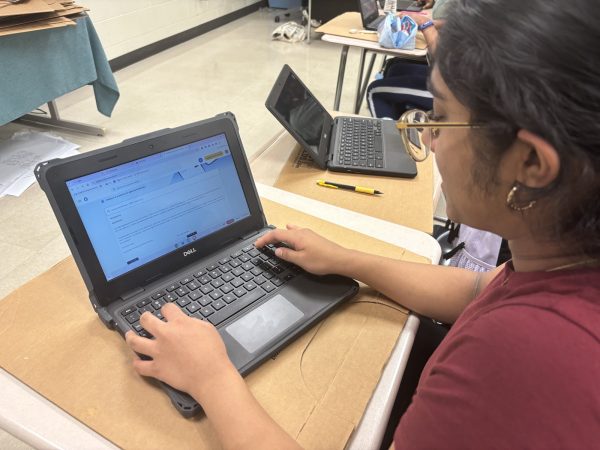Paper Books Vs. E-Books
Olivia Sullivan is one of the many students who utilize Lambert’s library. Which do you prefer: paper books or e-books?
The way we read has evolved over time, from hand-written stories on papyrus parchment to the first ever printed press in 1440. Needless to say, books are much different in the modern world. Technology today has presented many opportunities that ancient civilizations never dreamed of. E-books give society the ability to hold thousands of years worth of knowledge and tales in one hand. However, this may not be as beneficial as it sounds. Physical books allow the reader a connection with the author in a way electronics never could.
In almost every Language Arts class, students have been taught to annotate. This method of reading assists the reader by increasing the chances that they will retain the information. Although it is possible to make notes on an e-book, it isn’t very user friendly, and lacks the process of writing that improves memory. For instance, Venetia Zhu, a new freshman to Lambert, states that “It’s nice to be able to make notes and look at [them]. When you write it in your own handwriting, there’s some kind of connection between your brain and your hand.” Teachers have described annotating as a way to communicate with the author, and e-books lack that personal relationship.
On the other end of the spectrum, technology presents methods of customization that simply aren’t available to the classic paperback. Most e-books allow the reader to highlight and define words with a swipe of your finger. Also, the screen can enlarge the font, aiding those with impaired vision. Freshman student Emily Zhang explains that, “I have rather poor eyesight, and it’s a huge strain on my eyes when I look at small font in those of paper books.” Although, these features do not favor everyone, as some might find them distracting. Reading can be difficult when surrounded by a noisy environment. Those who use their phones to read novels may find it challenging to focus due to notifications and the extra characteristics.
Then, of course, there’s the unexplainable physical aspect of holding a book in your hands. All book-lovers know the distinct smell of a new book, and the satisfying feeling of the pages growing in your left hand and shrinking in your right as you progress through the story. “I like the texture of the pages… and to turn them. I like having them in my hand,” Brittany Grigorian (freshman) describes. Having a substantial reference motivates the reader to advance through the chapters, compared to a progress bar at the top of the screen. To cradle a book across your hands and feel the pages between your fingers makes each story an adventure.
This seems to be the most common opinion, as 85% of the people interviewed at Lambert agreed that paper books were superior to e-books. Lambert’s media specialist, Ms. Laguiate, states, “I have a lot of e-books [in Lambert’s library], but no one ever wants to check them out and use them. So, I try to stock more [paper] books.” This further proves that the general public prefers the classic over modern technology. Although the digital era is upon us, it cannot substitute for the benefits of reading from cover to cover.
Your donation will help support The Lambert Post, Lambert High Schools student-run newspaper! Your contribution will allow us to purchase equipment and cover website hosting costs.









Mary • Sep 7, 2017 at 1:16 pm
Enjoyed this article! I’ve tried reading on an iPad and miss hard copy books. They have a spirit and a
soul that can’t be duplicated digitally. I like the way you described this in your article.
Patricia Cerjan • Sep 2, 2017 at 2:35 pm
Very creative piece of work.